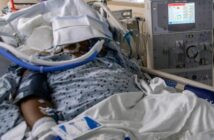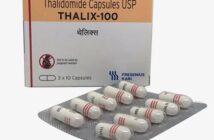By Agencies
Another COVID-19 vaccine has shown exciting results, potentially adding millions of doses to the supply of vaccines that could be available this year.
The vaccine from biotech firm Moderna was 94.5% effective, according to an early analysis of clinical trial results that the company released Monday.
The news follows drug maker Pfizer’s announcement last Monday that its vaccine also was more than 90% effective.
Both companies’ results are preliminary, scientists note. The final results may be better or worse. Outside scientists have not reviewed the data.
But “the vaccine is really the light at the end of the tunnel,” National Institute of Allergy and Infectious Disease Director Anthony Fauci told reporters. NIAID was part of Moderna’s study.
Supply boost
Moderna says it expects to have 20 million doses of vaccine ready to ship by the end of 2020 and up to 1 million available next year. Pfizer plans on 50 million doses this year and up to 1.3 billion next year. Both vaccines require two doses for full effect.
Moderna’s vaccine may be more accessible in rural areas and developing countries than Pfizer’s. Pfizer’s shots require special freezers to store them at minus 70 Celsius (minus 94 Fahrenheit), which are not widely available. The vaccine only last a few days at refrigerator temperatures.
Moderna’s vaccine uses a different formulation that can last about a month in the refrigerator or six months in a standard freezer.
Coalition for Epidemic Preparedness Innovations chief Richard Hatchett called it “terrific news and will allow the vaccine to be distributed broadly.”
If and when regulators give either vaccine emergency approval, the first doses will likely go to frontline health care workers and the most vulnerable, not the general public. Widespread distribution may not start until the middle of next year, experts say.
“No vaccine company has enough supplies available to protect everyone in need,” said University of Liverpool visiting pharmacology research fellow Andrew Hill. “We will need all the available vaccines with over 90% efficacy to cover global demand.”
Vulnerable groups
The Moderna study included 30,000 people, split evenly between those who received the vaccine and those who received a saltwater placebo shot.
Of the 95 participants who have developed COVID-19 so far, 90 of them received the placebo, including all 11 severe cases.
“The Moderna results are as good as we could have hoped for and really terrifically encouraging,” CEPI’s Hatchett said in a statement. CEPI helped fund several vaccine efforts including Moderna’s.
The company plans to end the trial and submit results to regulators “in the coming weeks” once it has two months of safety data and 151 cases of COVID-19.
The fact that the vaccine appears to prevent severe disease is significant, said immunologist Eleanor Riley at the University of Edinburgh. Pfizer’s vaccine is similar, but the company did not say whether any patients in its trial developed severe disease.
“The absolute prerequisite for a COVID-19 vaccine is that it stops people becoming ill enough to require hospital treatment and stops people dying,” Riley said. “The preliminary data reported here suggest that this vaccine — and by extension, the Pfizer/BioNtech vaccine — will achieve this goal.”
Moderna said that 15 elderly people and 20 patients from minority groups were among the 95 COVID-19 cases.
The report did not say how many received the vaccine or placebo, but the numbers suggest that the vaccine is providing some protection to these groups at higher risk of infection.
“We will need much more data and a full report or publication to see if the benefit is consistent across all groups, notably the elderly, but this is definitely encouraging progress,” said London School of Hygiene and Tropical Medicine pharmacoepidemiology professor Stephen Evans.
It is not yet clear whether the vaccine prevents infection, or just lowers the amount of virus enough to prevent disease scientists noted. Infected people can still spread the virus, even if they are not sick.
The results bode well for other coronavirus vaccines in the pipeline. Most of them target the spike protein, which the virus uses to enter cells and cause infection.
No major safety issues have come up yet in Moderna’s clinical trial. Less than 10% of patients developed minor short-term fatigue, muscle pain, headache or other side effects common to many vaccines.
Novelty
Both Moderna’s and Pfizer’s vaccines use a novel technology to produce immunity.
While most vaccines trigger the immune system by injecting a dead or weakened sample of the germ in question or a piece of it, the new vaccines inject genetic instructions for a part of the germ instead. The patient’s own muscle cells produce the germ part, which prepares the immune system to respond to a real infection.
“This is a huge advantage in terms of the speed at which vaccine candidates can be developed and produced in the future,” said Imperial College London vaccine expert Zoltan Kis.
Scientists can simply tweak the genetic code to design a new vaccine against a different disease. The manufacturing process and vaccine recipe would remain the same.
Results from several other vaccine trials are expected in the coming months. Nearly 50 are in human testing and more than 160 are undergoing lab tests, according to the World Health Organization.




